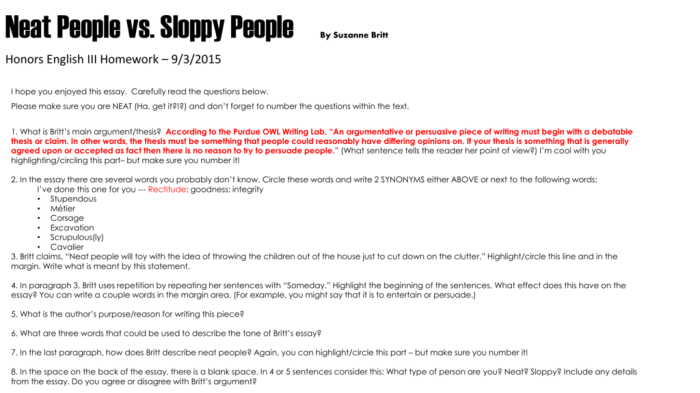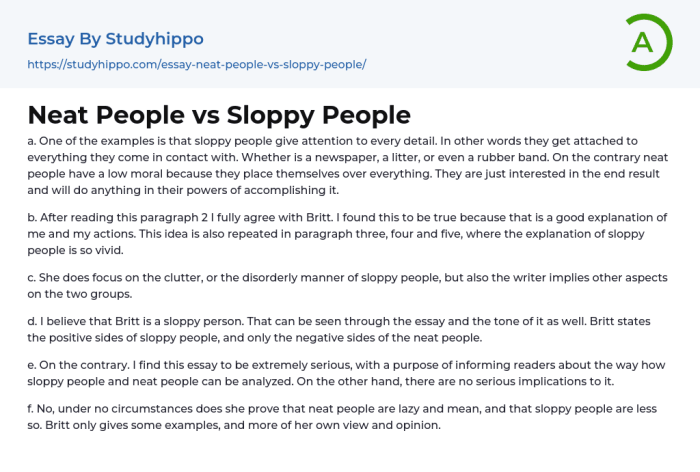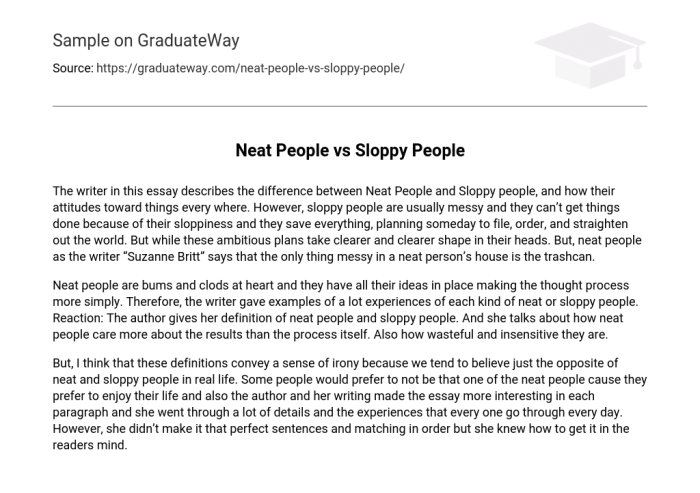Suzanne britt neat people vs sloppy people – Suzanne Britt’s seminal work on neat people versus sloppy people has sparked a captivating discourse on the psychological and environmental factors that shape our attitudes towards orderliness and disarray. This article delves into the intriguing distinctions between these two seemingly contrasting personality traits, examining their implications for behavior, relationships, and overall well-being.
Britt’s research has illuminated the subjective nature of neatness and sloppiness, demonstrating that these concepts are often defined by cultural norms and personal preferences. Nevertheless, she identifies certain commonalities among individuals who exhibit extreme tendencies towards either trait.
Neat vs. Sloppy: Defining the Spectrum: Suzanne Britt Neat People Vs Sloppy People

Neatness and sloppiness are terms used to describe the degree of order and tidiness in an individual’s behavior and environment. While these terms may seem straightforward, they are actually quite subjective and can vary depending on cultural and personal preferences.
Generally, neatness refers to a state of orderliness, cleanliness, and organization, while sloppiness is characterized by a lack of these qualities. Neat individuals tend to keep their belongings in place, maintain a tidy workspace, and adhere to a certain level of cleanliness.
Sloppy individuals, on the other hand, may be more disorganized, have a cluttered environment, and pay less attention to personal hygiene.
Psychological Differences between Neat and Sloppy Individuals
Research has identified several psychological traits that are associated with neatness and sloppiness. Neat individuals tend to be more conscientious, organized, and detail-oriented. They may also have higher levels of self-control and discipline. Sloppy individuals, on the other hand, may be more impulsive, creative, and nonconformist.
They may also have a lower tolerance for boredom and routine.
These psychological differences can impact behavior and relationships in various ways. For example, neat individuals may be more likely to succeed in structured environments that require attention to detail, while sloppy individuals may thrive in more creative and flexible settings.
Environmental Factors Influencing Neatness and Sloppiness, Suzanne britt neat people vs sloppy people
The environment can also play a significant role in shaping an individual’s neatness or sloppiness. Upbringing, culture, and socioeconomic status can all influence how we view and maintain order in our surroundings.
- Upbringing:Children who are raised in organized and tidy homes are more likely to develop neat habits themselves. Parents who model neatness and cleanliness can instill these values in their children.
- Culture:Different cultures have varying norms and expectations regarding neatness. In some cultures, neatness is highly valued and seen as a sign of respect, while in others, it may be less important.
- Socioeconomic status:Individuals from higher socioeconomic backgrounds may have more resources and opportunities to maintain a neat and organized environment. They may also have access to education and training that emphasizes the importance of neatness.
Benefits and Drawbacks of Neatness and Sloppiness
Both neatness and sloppiness can have their own advantages and disadvantages.
- Benefits of neatness:Neatness can contribute to organization, efficiency, and perceived competence. Neat individuals may be more likely to succeed in tasks that require attention to detail and may be perceived as more reliable and trustworthy.
- Drawbacks of neatness:Excessive neatness can sometimes be seen as rigid or inflexible. Neat individuals may also spend too much time on organizing and cleaning, which can take away from other important activities.
- Benefits of sloppiness:Sloppiness can foster creativity, flexibility, and nonconformity. Sloppy individuals may be more likely to think outside the box and come up with innovative ideas.
- Drawbacks of sloppiness:Excessive sloppiness can lead to disorganization, inefficiency, and perceived incompetence. Sloppy individuals may be more likely to miss deadlines and make mistakes.
Top FAQs
What are the key psychological differences between neat and sloppy people?
Research suggests that neat individuals tend to be more organized, conscientious, and perfectionistic, while sloppy individuals may exhibit higher levels of creativity, flexibility, and nonconformity.
How does the environment influence neatness and sloppiness?
Upbringing, culture, and socioeconomic status can all play a role in shaping an individual’s attitudes towards orderliness. For example, individuals raised in tidy homes may be more likely to value neatness, while those from chaotic environments may be more tolerant of disarray.
What are the potential benefits and drawbacks of being neat or sloppy?
Neatness can contribute to organization, efficiency, and perceived competence, while sloppiness may foster creativity, flexibility, and nonconformity. However, extreme neatness can lead to rigidity and perfectionism, while extreme sloppiness can result in disorganization and procrastination.


